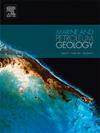构造和古气候对伊朗阿巴丹平原上白垩统(萨尔瓦克地层)沉积-二元演化和孔隙类型的控制作用
IF 3.6
2区 地球科学
Q1 GEOSCIENCES, MULTIDISCIPLINARY
引用次数: 0
摘要
本研究探讨了构造和古气候对伊朗扎格罗斯盆地阿巴丹平原上白垩统碳酸盐岩储层(Sarvak Formation)成岩演化的影响。通过岩相分析和扫描电子显微镜,分析了 Sarvak 地层的沉积面貌、成岩过程和孔隙系统。岩相分析确定了八种微岩相,它们沉积在碳酸盐岩斜坡的浅层至深层环境中。其中,浅滩复合地层和礁距地层中以颗粒为主的岩相(包岩和颗粒岩)被确定为最重要的储层岩相。该地层复杂的成岩历史包括海洋成岩、流星成岩和埋藏成岩过程,其中流星成岩在古暴露面下发挥了重要作用。萨尔瓦克地层被划分为八个流动单元、七个孔隙大小等级、十一个电成因、八个速度偏差带和十三个洛伦兹带。研究结果表明,最有利的储层单元位于仙人掌纪-震旦纪出露地表之下,其特点是流星过程和岩溶化作用导致以裸岩为主的岩层面大量溶解。构造抬升以及温暖潮湿(热带)古气候下的风化和侵蚀作用,对 Sarvak Formation 的成岩演化、孔隙类型和岩石物理特性产生了重大影响。这项研究强调了阿巴丹平原构造、古气候和岩石物理特性之间复杂的相互作用,加深了我们对构造活跃和古气候多变地区碳酸盐系统的了解。本文章由计算机程序翻译,如有差异,请以英文原文为准。
Controls of tectonics and paleoclimate on depositional–diagenetic evolution and pore types of Upper Cretaceous successions (Sarvak Formation) in the Abadan plain, Iran
This study examines the influence of tectonics and paleoclimate on the diagenetic evolution of Upper Cretaceous carbonate reservoirs (Sarvak Formation) in the Abadan Plain, Zagros Basin, Iran. Through petrographic analysis and scanning electron microscopy, the sedimentary facies, diagenetic processes, and pore system within the Sarvak Formation were analyzed. Facies analysis identified eight microfacies, which were deposited in shallow to deep settings of a carbonate ramp. Among these, the grain-dominated facies (packstone and grainstone) of shoal complexes and reef-talus settings were identified as the most important reservoir facies. The formation's complex diagenetic history includes marine, meteoric, and burial diagenetic processes, with meteoric diagenesis playing a significant role beneath paleoexposure surfaces. The Sarvak Formation was categorized into eight flow units, seven pore size classes, eleven electrofacies, eight velocity deviation zones, and thirteen Lorenz zones. The study's findings indicate that the most favorable reservoir units are located beneath the Cenomanian–Turonian exposure surface, characterized by significant dissolution of rudist-dominated facies due to meteoric processes and karstification. Tectonic uplift, along with weathering and erosion within a warm and humid (tropical) paleoclimate, significantly impacts the diagenetic evolution, pore types, and petrophysical properties of the Sarvak Formation. This research underscores the complex interplay between tectonics, paleoclimate, and petrophysical properties in the Abadan Plain, enhancing our understanding of carbonate systems in tectonically active and paleoclimatically dynamic regions.
求助全文
通过发布文献求助,成功后即可免费获取论文全文。
去求助
来源期刊

Marine and Petroleum Geology
地学-地球科学综合
CiteScore
8.80
自引率
14.30%
发文量
475
审稿时长
63 days
期刊介绍:
Marine and Petroleum Geology is the pre-eminent international forum for the exchange of multidisciplinary concepts, interpretations and techniques for all concerned with marine and petroleum geology in industry, government and academia. Rapid bimonthly publication allows early communications of papers or short communications to the geoscience community.
Marine and Petroleum Geology is essential reading for geologists, geophysicists and explorationists in industry, government and academia working in the following areas: marine geology; basin analysis and evaluation; organic geochemistry; reserve/resource estimation; seismic stratigraphy; thermal models of basic evolution; sedimentary geology; continental margins; geophysical interpretation; structural geology/tectonics; formation evaluation techniques; well logging.
 求助内容:
求助内容: 应助结果提醒方式:
应助结果提醒方式:


